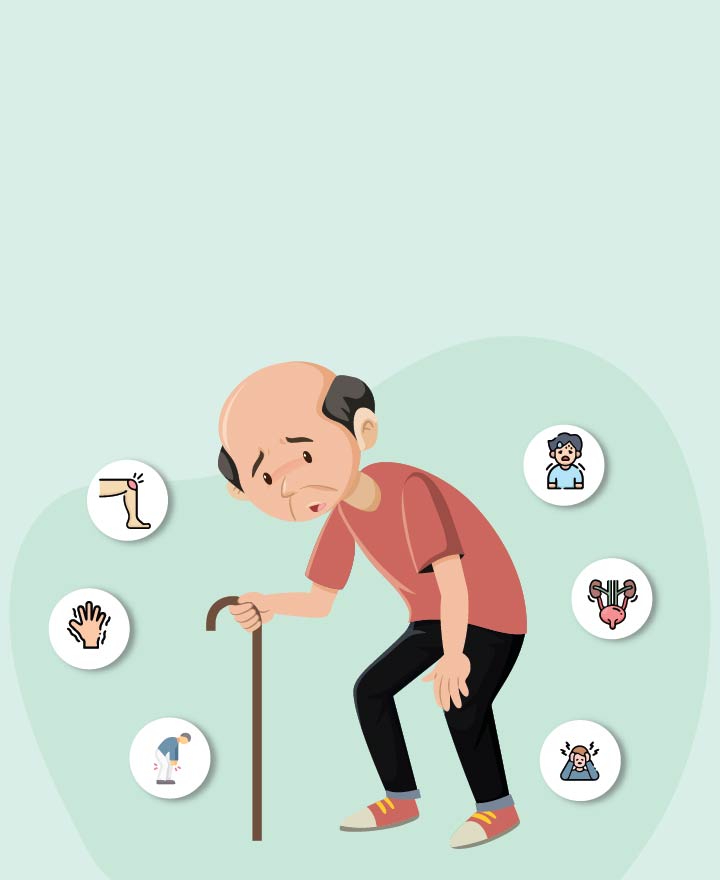Parkinson's Disease - Symptoms and Treatment
Parkinson's disease is a type of neurological disorder that affects the nervous system and parts of the body controlled by the nerves. Parkinson’s symptoms start slowly and may worsen with time if not detected at an early stage. While there is no permanent cure for the disease, Parkinson’s symptoms are easy to recognise which helps doctors to diagnose & manage the ailment effectively.
Symptoms of Parkinson's Disease
Only after assessing Parkinson’s symptoms, a physician makes the diagnosis and advice the right treatment. Some common Parkinson’s symptoms are:
1. Tremor in hands, arms, legs, jaw, or head. This is the most significant & common symptom of Parkinson’s disease
2. Bradykinesia or slowness of movement
3. Muscle stiffness, where muscles remain contracted for a long time
4. Impaired balance& coordination, sometimes leading to fall
5. Loss of voluntary actions such as blinking or moving of arms while walking
6. Speech impairment
Other Parkinson’s symptoms may include:
1. Depression, anxiety & other emotional changes
2. Difficulty swallowing, chewing, and speaking
3. Urinary problems or constipation
4. Skin problems
Treatment
While there is no definitive cure for Parkinson’s disease, the management of Parkinson’s symptoms is crucial. Some ways in which this can be done are:
1. Medical intervention in terms of prescribing medications, physiotherapy or even surgery may be required depending on how serious Parkinson’s symptoms are.
2. Exercising is necessary for a person suffering with Parkinson’s disease as it gives relief from stiffness and at the same time also helps in improving body posture and balance.Specific types of exercises, including some Yoga Asanas, are helpful for improving Parkinson’s symptoms.
3. Follow a balanced diet as it helps to relieve health issues such as constipation & insomnia by improving bowel movement & sleep quality.
4. Having supportive family members and friends around can help a person cope with the mental anxieties associated with Parkinson’s disease. Also, if required, one must seek for professional advice from a counsellor.
Conclusion
Parkinson’s disease has some very pronounced symptoms and they need to be managed with care. Follow all the tips and guidelines mentioned above and consult a good neurologist to ensure you get the best care and treatment needed.
Disclaimer: This blog provides general information and discussions about health and related subjects. The information and other content provided in this blog, website or in any linked materials are not intended and should not be considered, or used as a substitute for, medical advice, diagnosis or treatment. Kindly contact your Doctor before starting a new medicine or health regime.
Related Articles
Parkinson's Disease-Causes, Symptoms, and Treatments
Learn Tips To Handle Your Mental Health On Suicide Prevention Day
The Effects of Mental Stress on Your Body
Published on September 06, 2022

















 Car Insurance
Car Insurance  Bike/Two Wheeler Insurance
Bike/Two Wheeler Insurance  Health Insurance
Health Insurance  Pet Insurance
Pet Insurance  Travel Insurance
Travel Insurance  Home Insurance
Home Insurance  Cyber Insurance
Cyber Insurance  Third Party Vehicle Ins.
Third Party Vehicle Ins.  Tractor Insurance
Tractor Insurance  Goods Carrying Vehicle Ins.
Goods Carrying Vehicle Ins.  Passenger Carrying Vehicle Ins.
Passenger Carrying Vehicle Ins.  Compulsory Personal Accident Insurance
Compulsory Personal Accident Insurance  Travel Insurance
Travel Insurance  Rural
Rural  Critical illness Insurance
Critical illness Insurance